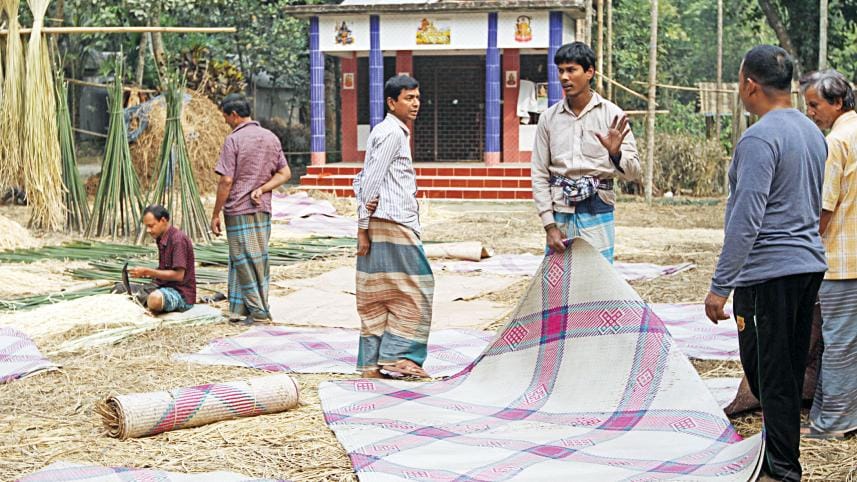Century-old craft under threat

The traditional craft of making shital pati mats in Tangail is facing a severe threat due to the shortage of raw materials and rising production costs. The lack of necessary capital has made matters worse for the craftsmen involved in this ancestral profession.
Shital pati mats, made with a special plant fibre that feels cool on the surface, have offered comfort to people in Bengal for ages, particularly during the summer. However, the demand for these mats has drastically fallen with the availability of cheaper plastic and other types of mats.
The shital pati industry, which involves around 1,000 families in several villages, including Hinganagar, Mushuria, Goziabari, Atia, and Elasin, is facing an uncertain future, according to the Delduar upazila administration.
The increased prices of raw materials, especially cane, and a lack of investment, are putting the century-old profession under threat, they added.
During a recent visit to Hinganagar village, local shital pati makers expressed their plight, saying that apart from the summer season, they have to sit almost idle. Local pati sellers said different types of shital patis are sold from Tk 500 to Tk 10,000.
However, due to the availability of cheaper alternatives, the sale of shital pati mats has reduced drastically, they added.
A shital pati market sits at Hinganagar village every Friday and Saturday, where wholesalers from across the country come and buy shital patis and sell those in different parts of the country.
The financial crisis is the biggest hurdle for the shital pati makers, and the shortage of cane, the main material for making mats, is becoming more apparent as the cultivation of cane is decreasing day by day, said Sunil Kumar, a local mat maker.
As a result, many involved in the industry are changing their profession, he added.
It takes two days to collect cane and process the fibre to weave a mat, while most of the weaving is done by women. They get Tk 200 to Tk 250 per shital pati mat, which takes two to three days to prepare, said Chhaya Rani, a resident.
Dilip Kumar Dey, a wholesaler from Jamalpur, said he buys a small mat for Tk 700 to Tk 1,000 and the big ones for Tk 1,500 to Tk 2,000. He earns a profit of Tk 50 to Tk 100 from each mat
Contacted, Atia Union Parishad Chairman Sirajul Haque Mallick said government support is needed to keep the shital pati industry alive.
"The demand for environmentally friendly items is increasing all over the world, and it is important to keep this industry alive. If the mat makers get necessary support, advanced training, and loan facilities, it is quite possible to earn foreign currencies by exporting the shital patis abroad," he added.
Shahnaz Begum, assistant general manager of Bangladesh Small and Cottage Industries Corporation in Tangail, said BSCIC provides loans of Tk 1 lakh up to Tk 3 lakh under a project for small and medium entrepreneurs (SMEs) in the district. So far, they have provided loans to some 30 to 40 shital pati makers in Delduar upazila.



 For all latest news, follow The Daily Star's Google News channel.
For all latest news, follow The Daily Star's Google News channel.
Comments